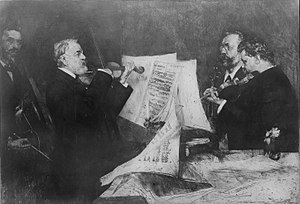Emil Ladenburg
Emil Ladenburg | |
|---|---|
| Born | 22 August 1822 |
| Died | 8 January 1902 (aged 79) |
| Nationality | German |
| Occupation | Businessman |
| Known for | President of E. Ladenburg |
| Spouse |
Eugénie Adèle Halphen
(after 1852) |
| Children | 4 |
| Parent(s) | Sara Mayer Ladenburg Herrmann Ladenburg |
| Relatives | Eugenie Mary Ladenburg Davie (granddaughter) |
Emil Ladenburg (22 August 1822 – 8 January 1902) was a Privy Councilor, German banker, and co-owner of the Frankfurt-based bank E. Ladenburg which was eventually purchased by Deutsche Bank in 1930.
Early life[edit]
Ladenburg was born to a wealthy Jewish family on 22 August 1822 in Mannheim, Grand Duchy of Baden.[1] He was the son of banker Herrmann Ladenburg (1791–1862) and Sara Mayer (1793–1855).
His grandfather, Wolf Ladenburg, had founded W. H. Ladenburg & Söhn in 1789. His uncle, Leopold Ladenburg, and his wife Delphine, were close friends of Johannes Brahms.[2]
Career[edit]
In 1838, his brother, Ludwig Ladenburg, established a branch in Frankfurt, Germany. In 1848, after the departure of his brother, Emil assumed control of the Frankfurt bank. The name of the bank was changed to E. Ladenburg after the parent in Mannheim went public.[3] In 1930, E. Ladenburg was purchased by Deutsche Bank.
Landenburg served as a Geheimrat (equivalent to a Privy Councilor).
Personal life[edit]

On 17 March 1852, Ladenburg married Eugénie Adèle Halphen (1829–1866), the daughter of a respected Parisian family related to the Paris Rothschilds. Together, Eugenie and Emil were the parents of four children, two sons and two daughters:[4]
- Adolph Ladenburg (1855–1896), who co-founded the private American merchant bank Ladenburg Thalmann, with Ernst Thalmann in 1876.[5] He married the American Emily Louise Stevens, daughter of Alexander Henry Stevens and niece of Byam K. Stevens.[6][7]
- August Ladenburg (1856–1929), who married Gertrud von Hergenhahn (Carl Friedrich August von Hergenhahn). After her death, he married Charlotte Emilie Schmidt (daughter of Gustav Adolf Schmidt).[8][9]
- Marie Ladenburg (b. 1857), who married the British Engineer Robert Searles Lindley (1854–1925),[10] the son of William Lindley and brother of William Heerlein Lindley.[11]
- Emma Ladenburg (1859–1939), who in 1877 married Dr. Wilhelm Ralph Merton, a founder of the University of Frankfurt and Metallgesellschaft.[12][13]
Ladenburg died on 8 January 1902 in Frankfurt, then part of Hesse-Nassau. He is buried in the Jewish cemetery in Rat-Beil-Straße.[14]
His strong interest in music made his home a meeting place for respected artists. The violinist and composer Joseph Joachim and the pianist and composer Clara Schumann were amongst the family's closest friends. Ladenburg hosted Johannes Brahms at his home when the "Joachim Quartet" played there in November 1894.[2]
References[edit]
- ^ Florian Waldeck: Ladenburg, in: "Old Mannheimer Families", writings of the Family History Association Mannheim, self-published, Mannheim 1920 (reprinted 1986).
- ^ a b Clive, Peter (2006). Brahms and His World: A Biographical Dictionary. Scarecrow Press. p. 295. ISBN 9781461722809. Retrieved 26 September 2019.
- ^ Dr. Leopold Ladenburg: Stammtisch of the Ladenburg family, published by J. Ph. Walther, Mannheim 1882.
- ^ New German Biography, Volume 13, page 388; Volume 17, page 185.
- ^ Supple, Barry E. (1957). "A Business Elite: German-Jewish Financiers in Nineteenth-Century New York". Business History Review. 31 (2): 143–178. doi:10.2307/3111848. JSTOR 3111848. S2CID 145758162.
- ^ "BANKER BROWNED AT SEA; Adolf Ladenburg Disappeared Mysteriously from the Niagara. HAD BEEN ON A TRIP FOR HEALTH Boarded the Steamer at Nassau Last Tuesday to Return to This City. LEFT HIS STATEROOM AT NIGHT Seasick and Suffering Pain from His Ailment -- May Have Taken Morphine" (PDF). The New York Times. 24 February 1896. Retrieved 26 September 2019.
- ^ The National Nurseryman. National Nurserymen Publishing Company. 1896. p. 32. Retrieved 26 September 2019.
- ^ Mosse, Werner Eugen (1989). The German-Jewish Economic Elite, 1820-1935: A Socio-cultural Profile. Clarendon Press. pp. 173–174. ISBN 978-0-19-822990-2. Retrieved 26 September 2019.
- ^ Biundo, Georg (1968). Die evangelischen Geistlichen der Pfalz seit der Reformation (Pfälzisches Pfarrerbuch) (in German). Degener. pp. 78, 464. ISBN 9783768640404. Retrieved 26 September 2019.
- ^ Rocznik Warszawski, Volume 31 (in Polish). Państwowy Instytut Wydawniczy. 2003. pp. 47–48. Retrieved 26 September 2019.
- ^ Evans, Richard J. (2016). The Pursuit of Power: Europe, 1815-1914. Penguin UK. p. 384. ISBN 9780241295779. Retrieved 26 September 2019.
- ^ Núñez, Clara Eugenia (1998). Entrepreneurial Networks and Business Culture. Universidad de Sevilla. p. 140. ISBN 9788447204441. Retrieved 26 September 2019.
- ^ Mosse, Werner Eugen (1987). Jews in the German Economy: The German-Jewish Economic Élite 1820-1935. Clarendon Press. pp. 188, 194. ISBN 9780198219675. Retrieved 26 September 2019.
- ^ Signpost to the tombs of well-known personalities on Frankfurt cemeteries. Frankfurt am Main 1985, p. 52.
